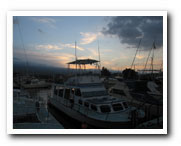To make it easier for state legislatures to pass anti-municipal broadband laws, the American Legislative Exchange Council (ALEC) has a piece of anti-municipal broadband model legislation entitled the “Municipal Telecommunications Private Industry Safeguards Act”. You can view the document here (Word format).
Monthly Archives: December 2004
Lands End Spinoff from Sears/K-Mart?
I’m rather certain that many Lands End folks would be happy (and relieved) if the Sears/K-Mart folks spun them off….. Doris Hajewski reviews analysts views on this matter.
The Art of Running A Small Business: Big Island Eco-Tours
 |
 |
This work marks the beginning of a periodic series this site will publish on interesting small business owners. Small business, as many know, are the engines behind real job growth. Put simply, we need more people to get creative, chase their dreams and start a business (triple this need in the rust belt where traditional manufacturing jobs are going away).
Today’s 3 degree (did it get that warm?) Madison weather means it’s time to visit Kona, Hawaii and take a look at Dan McSweeney’s: Captain Dan’s Eco-Tours. Or, perhaps more appropriately, the art and study of whale watching. Dan has taken his passion – marine biology – and made a life’s work out of it along with a real business. He also brings a certain art, or style to the whale watch process.
Read on…..
McDonald’s, Ray Kroc, Mark Knopfler and Listening to Lyrics
Listened to Mark Knopfler’s latest: Boom Like That early today. Every now and then, I end up paying attention to the lyrics. In this song, Knopfler tells a bit of the Ray Kroc story.
![]()
Madison WiFi: Ohio Tries to Block Municipal Telco Services
Falling further behind in true broadband services (2-way high speed internet), Ohio is evidently giving it up to the incumbent telco’s (SBC and others) via a bill to prevent municipal high speed networks.
WEAC Survey: Revenue Caps & School Spending
WEAC:
The Wisconsin Education Association Council and Wisconsin Association of School District Administrators annual survey of school administrators uncovered a new trend in the 2003-2004 school year: districts are being forced to cut academic programs because of state-imposed revenue controls. Revenue controls severely limit the funds school districts can raise and spend.
US/Wisconsin Broadband: Falling Further Behind
Local Property Taxes Generate the Most Government Cash
As 2004 draws to a close, the the State Department of Revenue and local media has published several interesting tax articles:
- Wisconsin Department of Revenue Tax Incidence Study – PDF full Study.
- Matt Pommer discussed the DOR’s study:
The biggest bite to Wisconsin taxpayers comes from the property tax, which generates 41.7 percent of all tax collections, a new state study finds.
But many lower-income property taxpayers are not using the credits available to save them money, the Department of Revenue report said.
“Property taxes were regressive across all household groups,” the study says. The poorest 20 percent paid an average 5.3 percent of their incomes in property taxes, while the highest income groups spent an average of 4 percent of their incomes on property taxes. - Avrum Lank & Steve Walters do the same:
The state Department of Revenue report, released today, calls the system that collected $15.1 billion in state and local taxes in 2001 “mildly progressive across households.” Officials said the 2001 tax burden was studied because the tax code hasn’t been rewritten since and complete data was available for that year.
Overall, property and sales taxes tend to hit low-income households hardest but are “offset” by deductions, graduated tax rates and breaks built into the state income tax system, the report adds. It defined a “progressive” tax system as one in which “households with greater income pay a larger share of their income in taxes than poorer households.”
USPS Kiosk Takes Your Photo
“According to FOIA documents obtained by EPIC new Postal Service self-service postage machines take portrait-style photographs of customers and retain them for 30 days.” IBM is the contractor behind the kiosks. Note that the kiosk is supposed to not complete the transaction if it determines the photograph has been compromised, so simply covering the camera is unlikely to work. As the cost of cameras and digital storage approaches zero, is it inevitable that every machine you interact with will take your photograph and store it? Via Slashdot.
DC Politicians Display Smarts in Their Baseball Stadium Deal
Interesting contrast to the Miller Park scheme hatched in Milwaukee & Madison some years ago, DC Common Council Chairman Linda Cropp has added some reality to the District’s deal with Major League Baseball:
At the John A. Wilson Building, anxiety over the future of baseball in Washington was evident all day. Mayor Anthony A. Williams (D) pronounced during his morning news conference that the deal was “in great, great jeopardy.” Council Chairman Linda W. Cropp (D), the architect of the legislative amendment that required private funding, said she was “looking to reduce the cost and risk for the District.”
“I keep hearing that we had a deal with baseball,” Cropp said. “Well, I have had a 30-year-plus deal with the citizens of this city. That deal trumps any other consideration with Major League Baseball.”